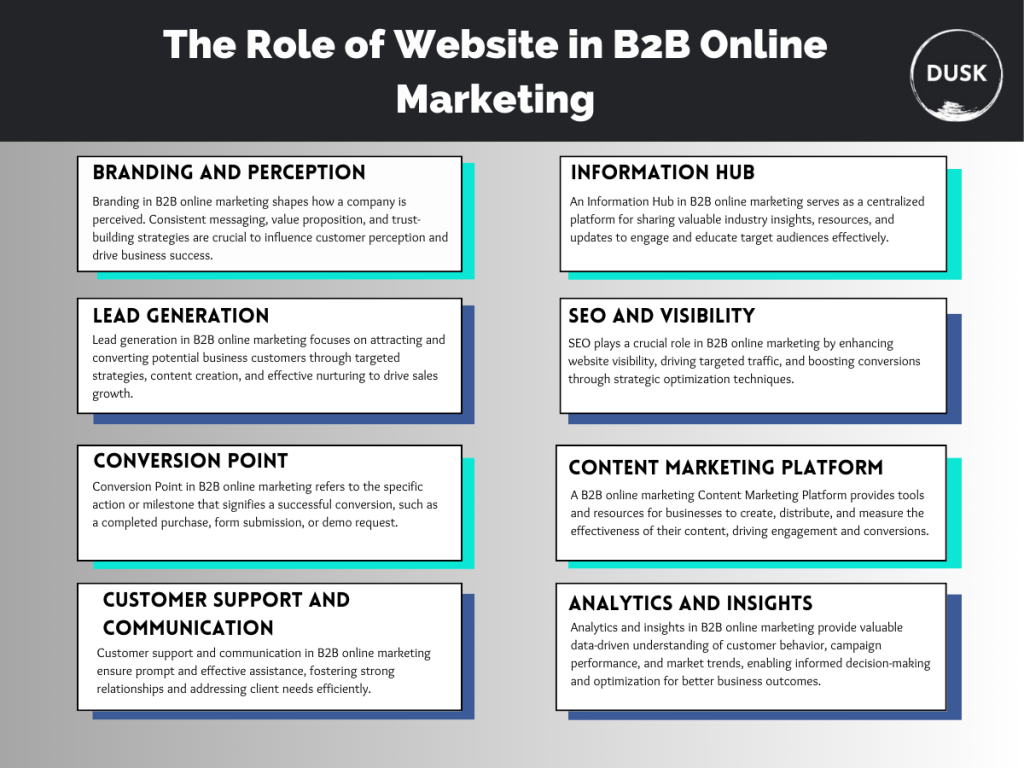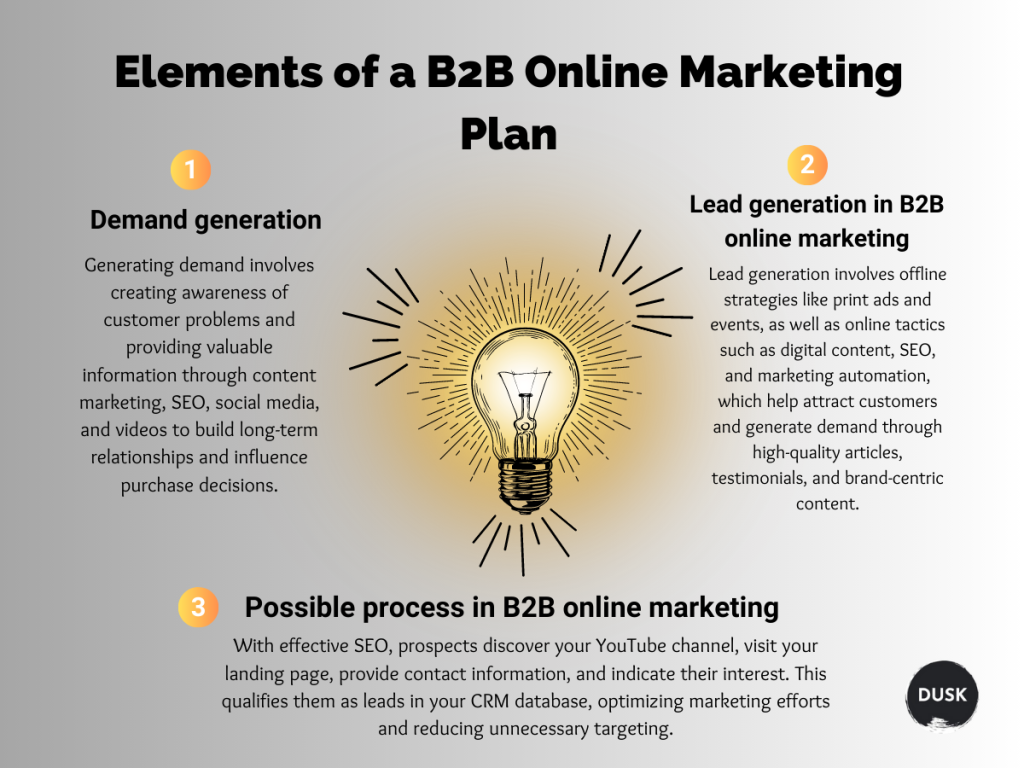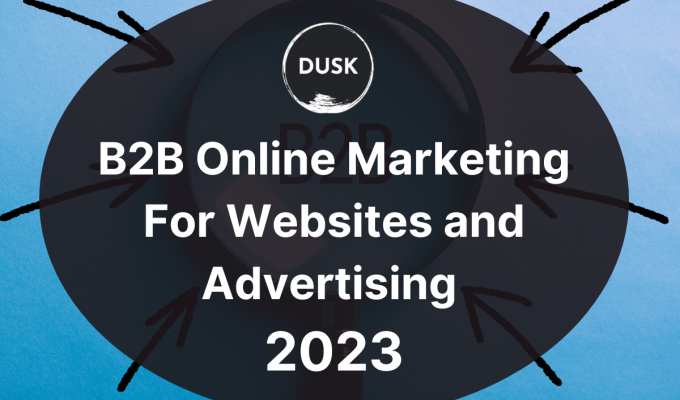You may be wondering what B2B online marketing for websites and advertising 2023 ? As the global business landscape continues to evolve and digitalize, companies are increasingly turning to online marketing strategies. This is particularly true for business-to-business (B2B) companies, where the potential for market growth and profitability is often tied to effectively connecting with other businesses.
B2B online marketing for websites and advertising is about leveraging digital platforms to foster relationships, cultivate leads, and drive sales. Here’s a detailed look at how B2B companies can maximize the potential of online marketing to boost their business outcomes.
Understanding B2B Online Marketing
B2B online marketing involves promoting products, services, and a company’s brand to other businesses via digital platforms. This differs from B2C (business-to-consumer) marketing in that the target audience comprises professionals, executives, or decision-makers within businesses and often involves higher-order values and longer sales cycles.
Online marketing strategies for B2B include:
- SEO (Search Engine Optimization)
- Content marketing
- Email marketing
- Social media marketing
- PPC (Pay-Per-Click) advertising
- Affiliate marketing
- Webinars
By understanding the distinct characteristics of B2B buyers, marketers can design strategies that attract, engage, and convert them effectively.
The Role of Website in B2B Online Marketing
The company website is the central hub of all B2B online marketing activities. It is the digital storefront where potential clients gather information about the company, its offerings, and its expertise. Given its importance, here are some crucial strategies for optimizing B2B websites:

Branding and Perception
The website acts as the face of a business online. It conveys the brand’s identity, values, and unique selling proposition. Its design, content, and overall user experience shape how potential clients perceive the business and decide whether to trust and engage with it.
Information Hub
B2B buying decisions often involve substantial research due to the high stakes and long-term implications. Websites serve as repositories of important information that B2B clients need, such as detailed product/service descriptions, pricing, case studies, testimonials, white papers, blogs, and FAQs.
Lead Generation
Websites play a key role in generating and capturing leads. This can be achieved through various means, such as offering valuable content in exchange for contact information, providing free trials or demos, or hosting webinars. Also, website forms for inquiries or quote requests allow interested visitors to reach out directly, providing high-quality leads.
SEO and Visibility
Search Engine Optimization (SEO) helps a website rank higher on search engine results pages, increasing visibility to potential clients searching for related products or services. This is essential in B2B online marketing, where potential clients often start their buying process with online research.
Conversion Point
Besides attracting and educating potential customers, the ultimate goal of a website is to convert visitors into leads or clients. Clear and compelling call-to-action (CTA) buttons, streamlined navigation, and optimized landing pages guide visitors toward taking the desired action, such as requesting a quote, booking a consultation, or making a purchase.
Content Marketing Platform
A website serves as the primary platform for content marketing, hosting blogs, articles, videos, podcasts, etc. This content helps to attract organic traffic, demonstrate industry expertise, engage potential clients, and nurture leads.
Customer Support and Communication
Websites can offer multiple customer support and communication channels, such as contact forms, live chat, or support portals. This can enhance customer satisfaction, foster relationships, and support customer retention.
Analytics and Insights
By integrating with tools like Google Analytics, websites provide valuable data about visitor behavior, traffic sources, popular content, conversion rates, and more. These insights can inform and enhance marketing strategies and tactics.
In conclusion, a well-designed, optimized, and managed website is crucial for successful B2B online marketing. It’s the foundation upon which other online marketing elements are built and plays a crucial role in influencing business outcomes.
Elements of a B2B Online Marketing Plan
A fundamental part of B2B online marketing is generating demand and capturing leads. Businesses must raise awareness about the problems their products or services solve, piquing the interest of potential customers and nudging them toward their solutions.

Demand generation
Generating demand comes before generating leads. This means that potential customers must first be made aware of their existing problem to search for solutions – and in the best case, find your product.
Demand generation includes various measures such as content marketing, SEO, video, and social media marketing. They all have a common goal: building a long-term customer relationship. The most important thing, however, is a good and consistent content marketing strategy.
Analyzing your target group beforehand is essential to avoid unused channels. Social media, increasingly a potent tool for demand generation among B2B buyers, can disseminate professional content like technical articles, webinars, and industry news. Blogs, leveraging storytelling, can forge emotional bonds with potential customers.
Repurposed as short videos, such content resonates well with customers, influencing their purchase decisions. Quality content is pivotal; poor content results in fewer customers and reduced sales. Companies must understand the prospects’ needs and preferred channels to provide valuable information.
Lead generation in B2B online marketing
Once product or service demand is established, leads can be generated. Lead generation involves both offline strategies, such as print advertisements and events, and online strategies, including digital content, SEO, and marketing automation.
Offline methods, especially personal contact during events, often result in customers willingly sharing their data. B2B online marketing encompasses all digital tactics to attract customers, including content marketing, which generates both demands and leads through high-quality articles, testimonials, and brand-centric content.
SEO is vital as it enhances the website’s visibility. Investing in the right keywords is crucial. Marketing automation software streamlines and optimizes marketing workflows, starting from lead generation to lead scoring, email marketing, content publication, and more. Some systems also offer landing page creation, conversion rate optimization, and content creation.
Possible process in B2B online marketing
With strong SEO, a prospect finds you on the first search result page and clicks on a link to your YouTube channel to watch an informative video. Intrigued, they follow a link to your landing page, enter their contact details, and opt for further contact or a resource like an e-book.
This process qualifies them as a lead in your CRM database, enabling your sales department to categorize them based on interest, company, products, etc. This method facilitates the creation of high-quality customer lists for future marketing efforts, minimizing wastage.
The Power of Advertising in B2B Online Marketing
While a robust website is key, companies should also harness the power of online advertising to extend their reach. Some effective B2B online advertising methods include:
- PPC Advertising: PPC platforms like Google Ads or Bing Ads allow businesses to target specific keywords and appear in search results, charging only when the ad is clicked. By using precise keyword targeting and well-crafted ads, B2B businesses can attract high-quality leads.
- Display Advertising: Display ads (banners, images, text ads, video ads) are used across a network of websites to reach potential clients. These are typically used for brand awareness, but proper targeting can also drive conversions.
- Social Media Advertising: Platforms like LinkedIn, Facebook, and Twitter provide opportunities for targeted advertising. LinkedIn, in particular, is a powerful tool for B2B marketing due to its professional demographic.
- Retargeting/Remarketing: By placing a pixel or tag on their website, companies can display targeted ads to users who have visited their website but not converted. This keeps the company at the forefront of prospects’ minds and increases the chances of conversion.
Measuring Success in B2B Online Marketing
In the world of B2B online marketing, measuring success is paramount. Without understanding the effectiveness of various marketing efforts, businesses risk wasting time, resources, and money on tactics that do not deliver results.
The metrics chosen to measure success should align with the company’s goals and objectives. Several key performance indicators (KPIs) and tools can help businesses gauge the success of their B2B online marketing strategies.
Key Performance Indicators (KPIs)
- Traffic: Website traffic is a primary indicator of your online visibility. Monitoring the number of visits, unique visitors, and page views provides insight into the reach and potential of your online marketing strategies.
- Lead Generation: The number of leads generated provides an immediate sense of the effectiveness of your marketing efforts. This could include form fills, email sign-ups, content downloads, or other actions that move a prospect closer to becoming a customer.
- Conversion Rate: This KPI reflects the percentage of website visitors who complete a desired action, such as filling out a form, subscribing to a newsletter, or making a purchase.
- Customer Acquisition Cost (CAC): The CAC measures how much your business spends to acquire a new customer. This includes marketing and sales expenses. A lower CAC indicates higher marketing efficiency.
- Customer Lifetime Value (CLV): CLV predicts the net profit from a customer’s future relationship. If CLV is significantly higher than CAC, it indicates a high return on investment.
- Bounce Rate: This reflects the percentage of visitors who leave your website after viewing only one page. A high bounce rate may indicate irrelevant traffic, poor website design, or unappealing content.
- SEO Rankings: The visibility of your website in search engine results directly influences traffic and lead generation. Monitoring changes in rankings for specific keywords helps evaluate the effectiveness of your SEO strategy.
- Social Media Engagement: Metrics such as likes, shares, comments, and followers on social media platforms provide insights into your brand’s reach and engagement.
Analytical Tools
There are various tools available to help measure these KPIs. Google Analytics, for instance, can track website traffic, bounce rate, and conversion rate. CRM platforms can help track leads and conversions and calculate CAC and CLV. SEO tools like SEMrush and Ahrefs can monitor keyword rankings, while social media analytics tools can measure engagement metrics.
In conclusion, the ability to measure success in B2B online marketing largely depends on selecting the right KPIs and utilizing the appropriate tools. These measures help businesses understand their marketing performance, identify opportunities for improvement, and make data-driven decisions for future strategies.






